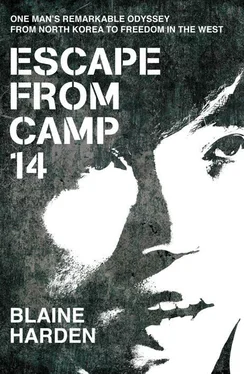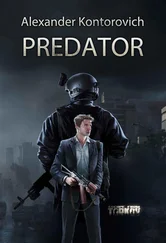Kim Jong Eun was born a communist prince and raised behind palace walls. He was educated under an assumed name in Switzerland and returned to North Korea to study in an elite university named after his grandfather. Because of his parentage, he lives above the law. For him, everything is possible. In 2010, he was named a four-star general in the Korean People’s Army despite a total lack of field experience in the military. A year later, after his father died of a sudden heart attack, state media in North Korea described him as ‘another leader sent from heaven’. He may, however, be forced to share his earthly dictatorship with older relatives and military leaders.
Shin was born a slave and raised behind a high-voltage barbed-wire fence. He was educated in a camp school to read and count at a rudimentary level. Because his blood was tainted by the perceived crimes of his father’s brothers, he lived below the law. For him, nothing was possible. His state-prescribed career trajectory was hard labour and an early death from disease brought on by chronic hunger — all without a charge or a trial or an appeal, and all in secrecy.
In stories of concentration camp survival, there is a conventional narrative arc. Security forces steal the protagonist away from a loving family and a comfortable home. To survive, he abandons moral principles, suppresses feelings for others and ceases to be a civilized human being.
In perhaps the most celebrated of these stories, Night , by Nobel Prize winner Elie Wiesel, the thirteen-year-old narrator explains his torment with an account of the normal life that existed before he and his family were packed aboard trains bound for Nazi death camps. Wiesel studied the Talmud daily. His father owned a store and watched over their village in Romania. His grandfather was always present to celebrate the Jewish holidays. But after the boy’s entire family perished in the camps, Wiesel was left ‘alone, terribly alone in a world without God, without man. Without love or mercy.’
Shin’s story of survival is different.
His mother beat him and his father, who was allowed by guards to sleep with his mother just five nights a year, ignored him. His brother was a stranger. Children in the camp were untrustworthy and abusive. Before he learned anything else, Shin learned to survive by snitching on all of them.
Love and mercy and family were words without meaning. God did not disappear or die. Shin had never heard of him.
In a preface to Night , Wiesel wrote that an adolescent’s knowledge of death and evil ‘should be limited to what one discovers in literature’.
In Camp 14, Shin did not know literature existed. He saw only one book in the camp, a Korean grammar text, in the hands of a teacher who wore a guard’s uniform, carried a revolver on his hip and beat one of his primary school classmates to death with a chalkboard pointer.
Unlike those who have survived a concentration camp, Shin had not been torn away from a civilized existence and forced to descend into hell. He was born and raised there. He accepted its values. He called it home.
North Korea’s labour camps have now existed for twice as long as the Soviet Gulag and about twelve times longer than the Nazi concentration camps. There is no dispute about where these camps are. High-resolution satellite photographs, accessible on Google Earth to anyone with an Internet connection, show vast fenced compounds sprawling through the rugged mountains of North Korea.
The South Korean government estimates that there are about one hundred and fifty-four thousand prisoners in the camps, while the US State Department and several human rights groups have put the number as high as two hundred thousand. After examining a decade of satellite images of the camps, Amnesty International noticed new construction inside the camps in 2011 and became concerned that the inmate population was increasing, perhaps to short-circuit possible unrest as power began to shift from Kim Jong Il to his young and untried son. [1] Amnesty International, ‘Images Reveal Scale of North Korean Political Prison Camps’, 3 May 2011, http://www.amnesty.org/en/news-and-updates/images-reveal-scale-north-korean-political-prison-camps-2011-05-03 .
There are six camps, according to South Korea’s intelligence agency and human rights groups. The biggest is thirty-one miles long and twenty-five miles wide, an area larger than the city of Los Angeles. Electrified, barbed-wire fences — reinforced by guard towers and patrolled by armed men — encircle most of the camps. Two of them, numbers 15 and 18, have re-education zones where some fortunate detainees receive remedial instruction in the teachings of Kim Jong Il and Kim Il Sung. If prisoners memorize enough of these teachings and convince guards they are loyal, they can be released, but they are monitored for the rest of their lives by state security. The remaining camps are ‘complete control districts’ where prisoners, who are called ‘irredeemables’, [2] Kang Chol-hwan and Pierre Rigoulot, The Aquariums of Pyongyang (New York: Basic Books, 2001), 79.
are worked to death.
Shin’s camp, number 14, is a complete control district. By reputation it is the toughest of them all because of its particularly brutal working conditions, the vigilance of its guards and the state’s unforgiving view of the seriousness of the crimes committed by its inmates, many of whom are purged officials from the ruling party, the government and the military, along with their families. Established around 1959 in central North Korea — near Kaechon County in South Pyongan Province — Camp 14 holds an estimated fifteen thousand prisoners. About thirty miles long and fifteen miles wide, it has farms, mines and factories threaded through steep mountain valleys.
Although Shin is the only person born in a labour camp to escape and tell his story, there are at least twenty-six other labour camp eyewitnesses who are now in the free world. [3] These eyewitnesses, including Shin, have been interviewed by David Hawk, a researcher for the US Committee on Human Rights in North Korea. Their stories and satellite photos of the camps can be found in Hawk’s periodically updated report, ‘The Hidden Gulag: Exposing North Korea’s Prison Camps’, first published in 2003.
They include at least fifteen North Koreans who were imprisoned in Camp 15’s edification district, and who won their release and later turned up in South Korea. Former guards from other camps have also found their way to South Korea. Kim Yong, a former North Korean lieutenant colonel from a privileged background in Pyongyang, spent six years in two camps before escaping in a coal train.
A distillation of their testimony by the Korean Bar Association in Seoul paints a detailed picture of daily life in the camps. A few prisoners are publicly executed every year. Others are beaten to death or secretly murdered by guards, who have almost complete license to abuse and rape prisoners. Most prisoners tend crops, mine coal, sew military uniforms, or make cement while subsisting on a near-starvation diet of corn, cabbage and salt. They lose their teeth, their gums turn black, their bones weaken and, as they enter their forties, they hunch over at the waist. Issued a set of clothes once or twice a year, they commonly work and sleep in filthy rags, living without soap, socks, gloves, underclothes, or toilet paper. Twelve- to fifteen-hour workdays are mandatory until prisoners die, usually of malnutrition-related illnesses, before they turn fifty. [4] Korean Bar Association, ‘White Paper on Human Rights in North Korea 2008’ (Seoul: Korea Institute for National Unification, 2008).
Although precise numbers are impossible to obtain, Western governments and human rights groups estimate that hundreds of thousands of people have perished in these camps.
Читать дальше












